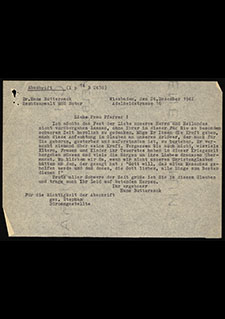Detention and Death
Buttersack was arrested on May 24, 1938 for disparaging remarks he made among regulars in a bar about Wiesbaden’s mayor Felix Piékarski (1890–1965), with whom he had been entangled in a legal dispute, and about the regime’s dignitaries. A waiter had denounced him and enabled the Gestapo to spy on the table of regulars.
During his interrogation, Buttersack cited his nature and his training as a soldier as reason for his statements. He brushed aside any views hostile to the state since he had always advocated a national awakening and a free and strong Germany (HStAW 467/1423).
Upon his release from custody on June 16, 1938, Buttersack was taken into protective custody for fourteen days. On December 14, 1939, a Special Court acquitted him of having violated the Treachery Act on grounds of insufficient evidence.
The Frankfurt District Attorney had initially declined to open proceedings since there was no desire to make the subject matter of the regulars’ conversations and the type of investigation public. Buttersack was allegedly trapped in antiquated ideas and embittered by the ban of the Stahlhelm and by the Church struggle. The time served prison would suffice as a warning (HStAW 461/7920). At a performance of Don Carlos, Buttersack loudly applauded the call for “freedom of thought”.
Buttersack came into conflict with judicial authorities anew in June to July of 1942. As defense attorney for a defendant charged with aiding and abetting the escape of two Frenchmen held prisoner of war, he had allegedly displayed too much understanding before the court for his client’s conduct.
Buttersack was arrested on May 6, 1943 for, among other things, having written a letter at Christmastime in 1942 comforting Martha Hoff, widow of Hans Hoff, pastor in Baden, and a full-blooded Jewess. He was additionally under investigation for having been notarizing gifts from Jews to Aryans since 1940 and thus helping them protect such assets from confiscation.
Buttersack had thus deliberately worked against the Reich’s interests according to an opinion of December 20, 1944 from the senior judge of Frankfurt higher regional court to the Reich Ministry of Justice. The judge summed up the Special Court’s prior decision to the effect that Buttersack voiced criticism of the government and Party, which is sanctioned by the Treachery Act (HStAW 458a/1397).
Following initial police custody, Buttersack was taken to Dachau concentration camp on May 28. Even Regional Bishop Ernst Dietrich (1897–1974) supported his cause with a letter to the head of the Reich Chancellery, Hans Lammers (1879–1962), in August of 1943. Buttersack had to work in aircraft production in Haunstetten subcamp near Augsburg – where approximately 2,700 inmates were housed between February of 1943 and April of 1944. He was buried under debris during an air raid and so seriously injured his leg that he was transferred back to Dachau. A bladder infection additionally worsened his condition.
His family’s efforts to secure his release in October of 1944 failed since Ernst Kaltenbrunner (1903–1946), Chief of the Security Police and SD, felt the security police’s interests had priority over Buttersack’s personal interests. The possibility that Buttersack’s contact with Hermann Kaiser (1885–1945), one of the conspirators of July 20, 1944, played a role here remains open.
Hans Buttersack died of typhus in Dachau on February 13, 1945, a few weeks after the Reich Ministry of Justice had urged Frankfurt’s district attorney general to interrogate Buttersack in Dachau about possible personal relationships with Jews and potential concealment of assets.
Source / title
- © Hessisches Hauptstaatsarchiv Wiesbaden, 458a/1397

